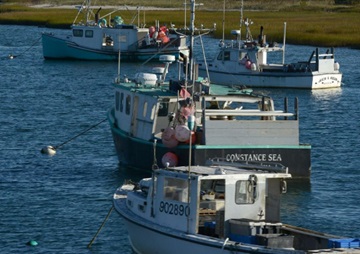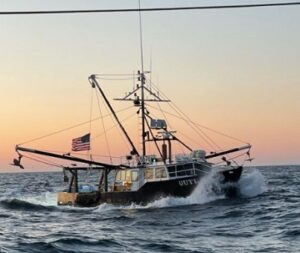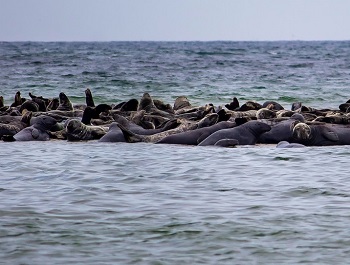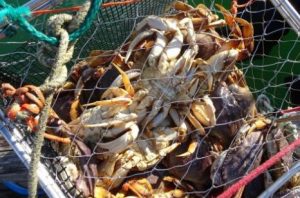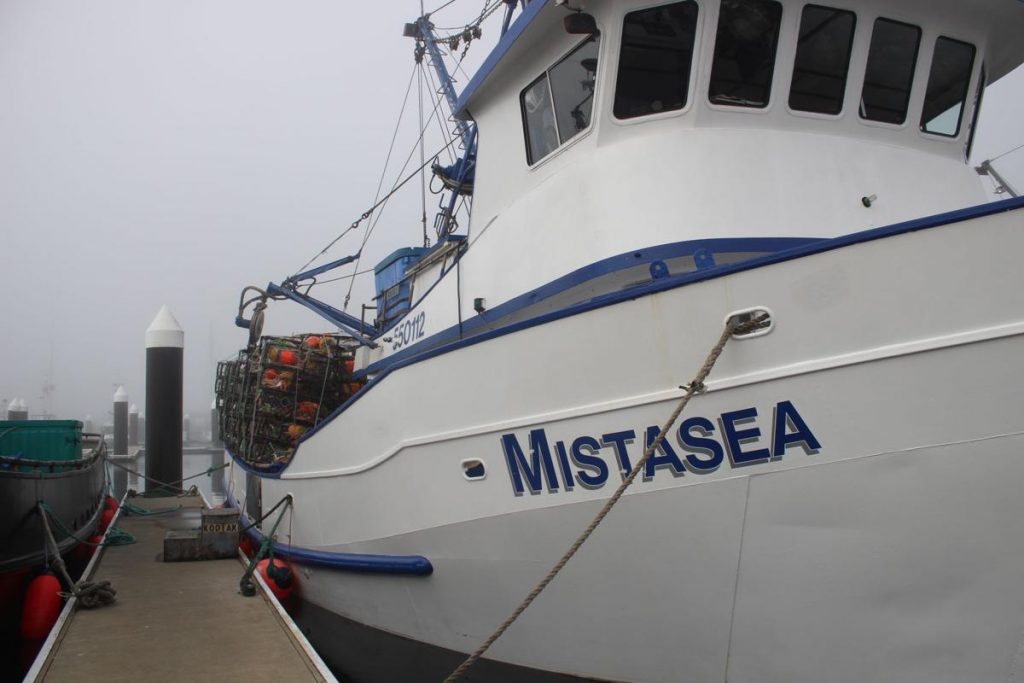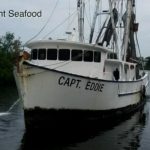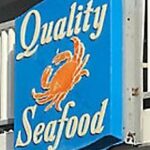Tag Archives: Cape Cod

‘Harpoon Hunters’ Review: Targeting Tuna on Discovery
When a show like “Deadliest Catch” can last for 20 seasons—and even outlast a collapse in the Alaskan crab population—there is a decided hunger for something like “Harpoon Hunters,” which makes a lot of sense, especially for its producers. Humans are battling the ocean and the treasure is aquatic, but summer on Cape Cod is considerably more congenial than winter in the Bering Sea. And the contest at hand is still daunting—catching high-priced Atlantic bluefin tuna with a spear (and enough accompanying voltage to kill the fish instantly). There are rivalries, deadlines, anguish, setbacks, mangled men and mangled language. It’s a combination seafood platter. Video, more, >>CLICK TO READ<< 13:01
Fishermen Join Fight for Herring Trawler Rules
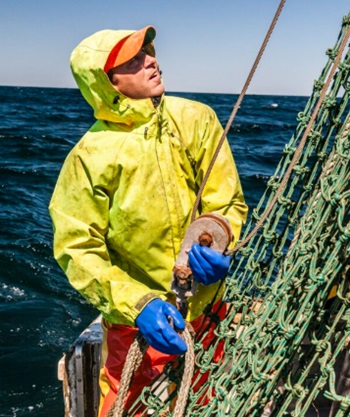 The marine ecosystem around Cape Cod is built on the backs of Atlantic herring. These baitfish school in massive numbers, providing food for marine mammals, seabirds, and large fish like cod. Their eggs, which they lay in the fall and are dense enough in spots to carpet the ocean floor, are food for crabs and other bottom-dwelling animals. They are also a $4.5-million fishery, used as bait for lobster traps, turned into canned sardines, and sold, frozen or salted, overseas. But with the Atlantic herring population in a steep decline, and the most recent attempt at a rule to protect the fish thwarted, Cape Cod fishermen are advocating for new ways to protect the species. more, >>CLICK TO READ<< 09:21
The marine ecosystem around Cape Cod is built on the backs of Atlantic herring. These baitfish school in massive numbers, providing food for marine mammals, seabirds, and large fish like cod. Their eggs, which they lay in the fall and are dense enough in spots to carpet the ocean floor, are food for crabs and other bottom-dwelling animals. They are also a $4.5-million fishery, used as bait for lobster traps, turned into canned sardines, and sold, frozen or salted, overseas. But with the Atlantic herring population in a steep decline, and the most recent attempt at a rule to protect the fish thwarted, Cape Cod fishermen are advocating for new ways to protect the species. more, >>CLICK TO READ<< 09:21
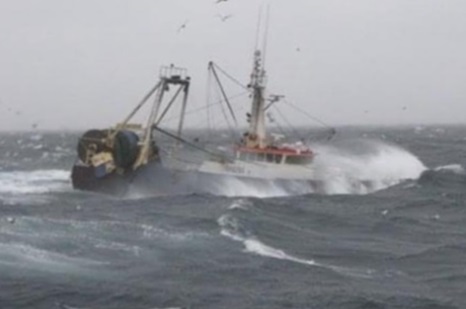
More things to worry about by Jerry Leeman
Wind energy in the Gulf of Maine is going to be a great challenge to all varieties of commercial and recreational fisheries. What disturbs me the most is, in all my travels along the coast in the four major fishing ports in New England, very few commercial fishing Captains were aware of the new talks on changing the management stock areas and the reallocation of codfish. This is a concern for many now that they are aware. This raises the question, if no Captain’s that fish inside the Wind Energy proposed areas were not aware of this future action, then how can the last comment periods on the proposed sights be accurately sighted? Charts graphs, more, >>click to read<< 13:16
Coast Guard finds no pollution after fishing boat runs aground on Cape Cod
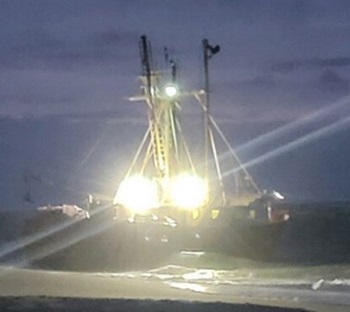 The United States Coast Guard determined there is no pollution after a fishing boat ran aground at Ballston Beach in Cape Cod on Friday. Authorities say they were notified at around 2:30 a.m. that the Miss Megan vessel hat ran aground. No injuries were reported. The boat was refloated at around 5:30 p.m. and towed to New Bedford after it was determined there was no pollution. Click the photos. Photos, >>click to read<< 13:05
The United States Coast Guard determined there is no pollution after a fishing boat ran aground at Ballston Beach in Cape Cod on Friday. Authorities say they were notified at around 2:30 a.m. that the Miss Megan vessel hat ran aground. No injuries were reported. The boat was refloated at around 5:30 p.m. and towed to New Bedford after it was determined there was no pollution. Click the photos. Photos, >>click to read<< 13:05
Casting for an answer: Can you make a living on the Cape as a commercial rod and reel fisher?
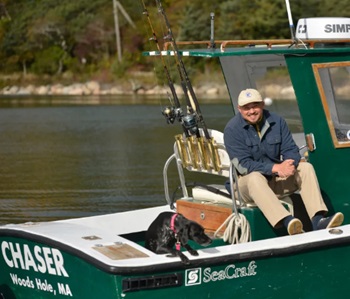 Ken Baughman is two years into his attempt to make a living as a commercial rod and reel fisherman. It started, he said, after he got into an argument with another commercial fisherman who said it couldn’t be done. Baughman thought there was a way, one that would require him to take unusual steps and supplement his income with other work. Fishing has always been a passion for the 44-year-old, who said it would be the thing he’d do if he had a million bucks. Baughman doesn’t have $1 million, and his rod and reel efforts haven’t provided him with sufficient finances yet — but he believes that if he can figure out a way to make commercial rod and reel work, others will follow. But the real cost is getting permits for closed fisheries such as black sea bass. Those permits can only be bought from commercial fishermen selling theirs. more. >>click to read<< 18:24
Ken Baughman is two years into his attempt to make a living as a commercial rod and reel fisherman. It started, he said, after he got into an argument with another commercial fisherman who said it couldn’t be done. Baughman thought there was a way, one that would require him to take unusual steps and supplement his income with other work. Fishing has always been a passion for the 44-year-old, who said it would be the thing he’d do if he had a million bucks. Baughman doesn’t have $1 million, and his rod and reel efforts haven’t provided him with sufficient finances yet — but he believes that if he can figure out a way to make commercial rod and reel work, others will follow. But the real cost is getting permits for closed fisheries such as black sea bass. Those permits can only be bought from commercial fishermen selling theirs. more. >>click to read<< 18:24
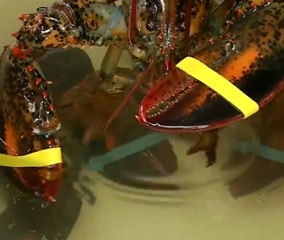
Decline in young lobsters triggers change in legal catch size
The Atlantic States Marine Fisheries Commissioner approved in May new management measures when the survey of sublegal lobsters declined by 35 percent. The most recent stock survey shows a 39 percent decline. “The fact that we’ve hit the trigger this soon comes as a significant surprise,” DMR Commissioner Patrick Keliher said. “When the Board voted on the Addendum in May, it was anticipated that the trigger would not be hit for a year or two.” Keliher had initially broached to the ASMFC a higher trigger of 38 percent than the 35 percent that passed. But at the latest board meeting, he successfully delayed implementing the first size change from June 1, 2024, as initially set in the Addendum, to Jan. 1, 2025. >>click to read<< 08:08
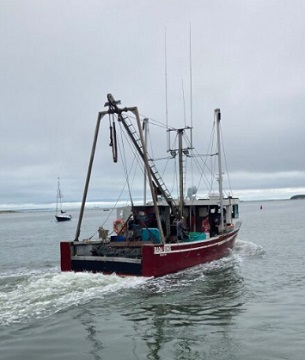
The Cape’s Scallopers Ride Out a Perfect Storm
This summer, a perfect storm combining sky-high fuel costs, a scarcity of experienced crew members, low wholesale prices, sharp declines in what scallop fishermen are allowed to take, and costly quota, has been keeping Cape Cod’s small-boat scallopers off the water. “There are a quite a few changing over to do other kinds of fishing because they can’t afford to go scalloping right now,” said Max Nolan, a scalloper from Eastham who owns the F/V Outlaw. “I don’t know how anyone is making it,” said Chris Merl, a Wellfleet scalloper and captain of the F/V Isabel & Lilee. Atlantic scalloping, which stretches from the waters of Maine to North Carolina, is one of the most lucrative fisheries in the nation, with its yearly catch valued at upwards of $500 million. But this year (the fishing year begins in April and ends in March), regulators have dropped the total amount of scallops boats are allowed to harvest to its lowest level in over a decade, and the limit stands at just 41 percent of what it was in 2019. >click to read< 08:55
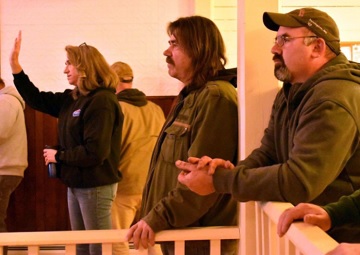
DMR brings news of declining young lobsters, resiliency measures to local lobstermen
“We’re not talking about whales.” Those were among the first words from Kathleen Reardon, lead biologist for the Maine DMR, to lobstermen at Stonington Town Hall on March 31. Both ongoing lawsuits and legislation aimed at protecting right whales from entanglement with lobster trap lines have delayed lobster stock assessments and analysis. But now lobster councils are meeting across the state to hear about a draft addendum to the Atlantic States Marine Fisheries Commission lobster management plan for the Gulf of Maine and Georges Bank, where 90 percent of U.S. landings are. The ASMFC manages near-shore fisheries for 15 states, including Maine. The draft addendum would affect Lobster Management Areas 1 and 3 and off Cape Cod as well as Maine, New Hampshire and Massachusetts. >click to read< 16:37
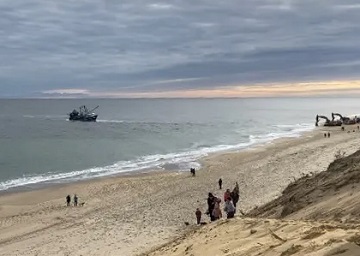
F/V Carrabassett: Free at Last! Five-day grounding on Truro beach ends Saturday morning
A 78-foot fishing boat out of New Bedford that grounded early Tuesday off Longnook Beach was pulled back into the water Saturday morning, ending a five-day ordeal for owner Blue Harvest Fisheries in New Bedford. At the moment the tug boat pulled the Carrabassett toward the water, and the vessel appeared to respond by floating along behind the tug, cheers from well-wishers at the beach went up. “You don’t see it every day,” Provincetown resident and commercial fisherman Joel Carreiro said Saturday morning,,, As the Carrabassett was pulled out into the water by the tug, two excavators stood by on the beach, and then began to move south once the vessel was fully floating. photos, >click to read< 14:27
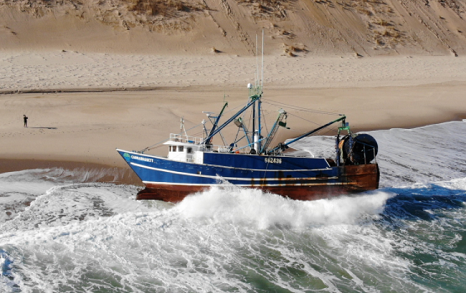
New Bedford Vessel Runs Aground on Longnook Beach
Part-time Truro resident Lynda West went with her father-in-law, Jock West, to Longnook Beach on Tuesday to take photos of the calm waters with his drone at low tide. “When we got here, I turned to him and said, ‘You hit the jackpot,’ ” Lynda said. “I’ve never seen anything like it.” At the bottom of the steep slope below the beach parking lot was a 78-foot blue-and-white groundfishing boat, the F/V Carrabassett, beached on the sand with one green light on and its radar dish spinning. “That’s not a good situation there,” said Provincetown fisherman Chris King, looking at the boat from the parking lot. >click to read< 09:48
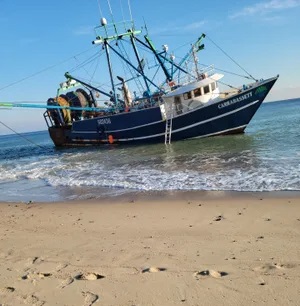
Plan to move grounded trawler off Truro is in the works
A plan to salvage a 78-foot shrimp trawler that ran aground Tuesday near Highland Light was in the works Wednesday, according to U.S. Coast Guard Petty Officer Briana Carter. The Coast Guard and Truro police received a report of the grounding early Tuesday. Five people were aboard the boat, and there were no reported injuries, Carter said. On Wednesday, Truro Harbormaster Tony Jackett described the trawler, the New Bedford-based F/V Carrabassett, the owner planned to attempt to dislodge the boat at high tide Wednesday evening, Jackett said. >click to read< 12:36
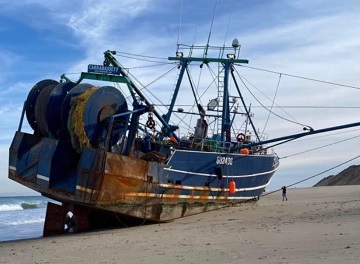
Commercial Fishing Vessel Runs Aground off Truro
A fishing vessel ran aground in Truro Tuesday. The 78 foot F/V Carrabassett, home ported in New Bedford, came ashore in the area of Long Nook Beach. No injuries were reported. The cause of the grounding was under investigation. >click to read<, and enlarge image. 17:42
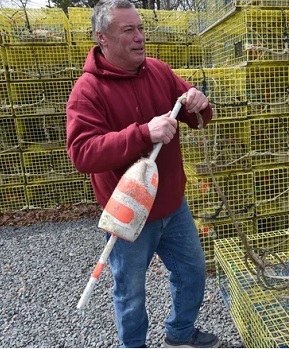
Right whale protection regs leave Cape fishermen feeling trapped
His house on the quarter-acre lot is nearly surrounded by gravel, with bright yellow and black fishing traps neatly stacked all around. Tolley is gearing up for the fishing season, is headed for a hip replacement in a month, but that wasn’t his only concern. New state regs require that he fit the buoy lines on all 1,200 of his lobster, conch and black sea bass traps with special sleeves that release under the pressure of an adult whale. “I don’t want to see a right whale entangled,”,,, He worries about the financial pressures imposed on him and other fishermen by regulations >click to read< 13:42
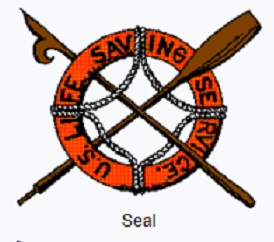
On this day in 1873: Life-saving stations on Cape Cod manned for first time
On this day in 1873, a series of stations on the Outer Cape built for the newly created U.S. Life Saving Service were manned for the first time. Situated astride the heavily trafficked shipping lanes between New York and Boston and thrust 40 miles out to sea from the mainland, Cape Cod had gained a notorious reputation among mariners. Over the centuries, it became a graveyard to more than 3,000 shipwrecks. >click to read< , To read more, >click here< 07:56
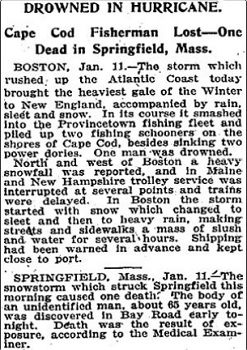
On this day in 1922, Cape Cod Fisherman lost in weird January Hurricane, 2006: Lady Grace rescued a year before she sank
On this day in 1922 the newspapers reported a January hurricane three months after the normal end of the hurricane season. DROWNED IN HURRICANE; Cape Cod Fisherman Lost; One Dead in Springfield, Mass., On this day in 2006 the Coast Guard towed a 76-foot fishing vessel to safety after the vessel became disabled near Nantucket early Monday morning. Almost exactly a year later, on January 27, 2007, the Coast Guard launched a massive search for the fishing boat Lady of Grace after the 75-foot dragger failed to return as scheduled to New Bedford. >click to read< 07:46
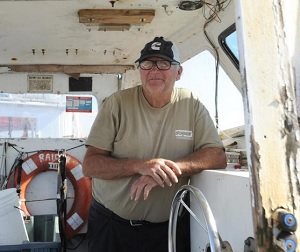
Truro lobsterman says rules to protect right whales costly to his business
Cheryl Souza is ending her lobster sales after October. But third-generation lobsterman Billy Souza, as it turns out, is considering quitting as well. “It’s all the whale issues,” Souza said. Unlike the lobstering in the days of Souza’s grandfather, Frank Souza, and his father, William Souza, the current generation fishing off Cape Cod is under an intense and unique scrutiny..,, “The whales could get entangled anywhere in the world, but there’s so many eyes on them here it looks like we’re the bad guys and we’re not.” >click to read< 07:38
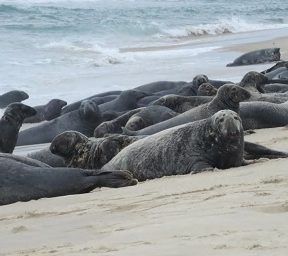
Naturalist Peter Trull: Don’t Blame The Seals
Why are there virtually no codfish to be found in the waters off Cape Cod? Depending on who you ask, it’s because of the eating habits of the thousands of gray seals now living in local waters, or it’s because of decades of chronic overfishing plus ecological changes, like warming oceans. Peter Trull, Pleasant Bay Community Boating Curriculum Developer and Naturalist, comes down squarely on the latter cause. He calls blaming the seals “the biggest misconception” that exists on this topic today. >click to read< 07:18
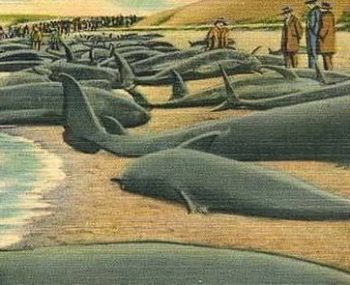
On This Day in 1958: Fifty whales stranded on Cape Cod
The United Press International wire story began; Tides Strand 50 Whales Off Cape Cod Island WELLFLEET, Mass., July 5 (UPI) — Tides of the Atlantic Ocean that refloated some 100 small whales brought more than half of them back again today… Townsfolk, aware of the problem of removing dead (and very smelly) whales from the sand bars, were joyful when an early morning tide washed most of the mammals free. But the joy was short-lived. The afternoon tide brought about sixty of the whales back onto the shore. >click to read< 08:06
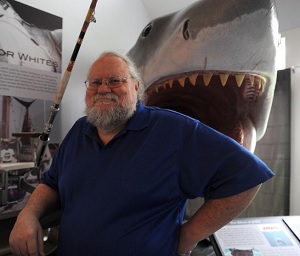
Cape Cod: Expert says sharks, seals here to stay
Last year, George Burgess predicted that a fatal shark attack would occur on Cape Cod within five years. “It’s the combination of a large predator, and the things they eat, both gaining in population size and both coming back to lay claim to areas that historically were theirs 150 years ago,” Burgess, now retired after 40 years as a shark researcher and curator, was on the Cape last week to gather information for the shark attack file on the region’s two shark attacks this summer, including one that resulted in the death of 26-year-old boogie boarder Arthur Medici. Burgess stressed his concern over the loss of life and his sympathy for the victim and his family, but said the Cape has now turned a corner,,, >click to read<11:09

Man killed in Massachusetts shark attack, first since 1936
A man who was swimming near a beach off the coast of Massachusetts was killed Saturday when he was attacked by a shark, officials say, making it the state’s first fatal shark attack in more than 80 years. The incident happened at about 12:30 p.m. ET on Saturday when the man, believed to be in his mid-20s, was swimming near Newcomb Hollow Beach in Wellfleet, a town on Cape Cod.
The victim suffered serious injuries and CPR was performed at the beach, but he was later pronounced dead at Cape Cod Hospital. >link<15:46
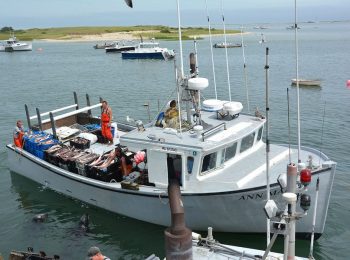
Can dogfish save Cape Cod fisheries?
Cape Cod has nearly lost its namesake fish, due to overfishing and climate change. So fishermen have switched to dogfish, skates, and other more plentiful options. This move could help revive the Massachusetts fishing industry, and might even help the cod rebound, researchers say. But getting Americans to bite may not be as easy. “This is the fish we could feed the United States with,” says Chatham fisherman Doug Feeney. “We have people that are hungry. We have prison systems. We have vets. We have homeless people. There’s just so much that can be done with this product.”>click to read<10:49

Fishermen Urge Regulators to Establish 50-Mile Buffer Zone for Herring Trawlers
Local fishermen and elected officials from across Cape Cod strongly urged fishery managers Tuesday to impose a strict 50 mile buffer zone for mid-water herring trawlers. At an overflow meeting in the Chatham Community Center, they said the vessels are wiping out the herring, negatively impacting the local fishing industry and related economies. The New England Fishery Management Council is considering changes in the rules that govern the trawlers and has been taking comments at various ports around New England. >click to read<11:05
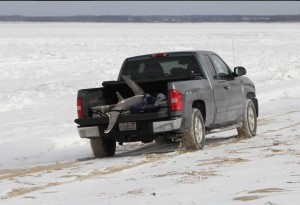
Sharks freeze to death in sub-zero temperatures in the US East Coast
Cities along the East Coast of the United States are experiencing record-breaking snowfall and extreme drops in temperature; it’s been so cold that sharks have been washing up on shore frozen to death. Atlantic White Shark Conservancy has reported that a number of thresher sharks which washed up dead on Cape Cod are likely to have died from ‘cold shock’ due to the ice cold temperatures in the water. click here to read the story 14:22
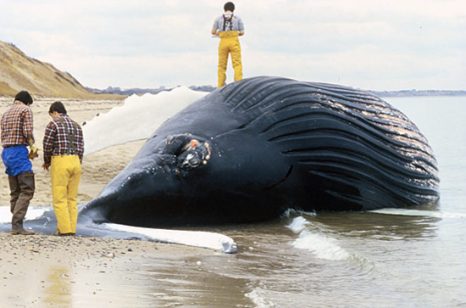
On This Day: Dec. 19, 1987, An “unprecedented mortality” – Tainted Fish Found in Dead Whales on Cape Cod
Contaminated mackerel were found in the stomachs of nine whales that died recently along Cape Cod beaches, a finding that may help explain other mysterious marine fatalities, researchers said today. ”We have what appears to be an unprecedented mortality in marine mammals,” Joseph R. Geraci, a marine pathologist, said at the New England Aquarium here. ”Perhaps not unprecedented in that it occurred, but unprecedented in that we have discovered for the first time a biological toxin that is directly reponsible for the deaths.” click here to read the story 08:49
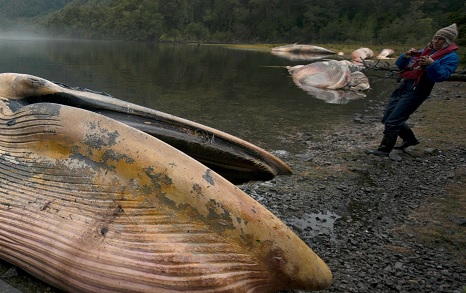
Death by Killer Algae
They didn’t think much of the first dead whale. Dwarfed by the rugged cliffs of Patagonia’s high green fjords, the team of biologists had sailed into a gulf off the Pacific Ocean searching for the ocean’s smaller animals, the marine invertebrates they were there to inventory. That night, while hunting for an anchorage in a narrow bay, the team spotted a large, dead whale floating on the water’s surface. But for the biologists, death—even of such an enormous animal—didn’t seem so unusual. Not so unusual, that is, until they found the second whale, lying on the beach. And a third. And a fourth. In all, they found seven in that bay alone. Over the next day, they counted a total of 25 dead whales in the fjord. click here to read the story 15:42
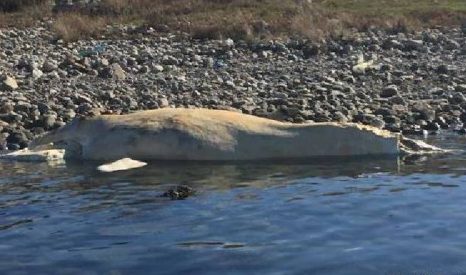
Another North Atlantic right whale found dead on Cape Cod
Yet another North Atlantic right whale carcass has been discovered, the sixteenth confirmed death of the endangered species this year. The International Fund for Animal Welfare says the carcass was found on Nashawena Island, south of Cape Cod in Massachusetts. The animal welfare organization says the carcass was “very decomposed,” but it is working alongside the U.S. National Oceanic and Atmospheric Administration to determine the cause of death. click here to read the story 09:47
On This Day – October 8 – 1984: Ninety-four whales die after beaching in Eastham
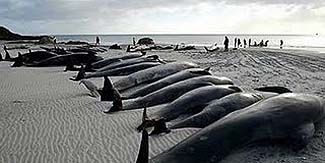 On this day in 1984, workers from the New England Aquarium began giving lethal injections to beached pilot whales that could not be saved. Ninety-four whales, some 20 feet long, were stranded Saturday on a beach in Eastham. The cause of the mass beaching, the largest in the Cape Cod area in recent years, is not known. Mass strandings of dolphins, whales, and other marine mammals date back to the time of Aristotle, but some environmental activists,,, click here to read the story 09:27
On this day in 1984, workers from the New England Aquarium began giving lethal injections to beached pilot whales that could not be saved. Ninety-four whales, some 20 feet long, were stranded Saturday on a beach in Eastham. The cause of the mass beaching, the largest in the Cape Cod area in recent years, is not known. Mass strandings of dolphins, whales, and other marine mammals date back to the time of Aristotle, but some environmental activists,,, click here to read the story 09:27






